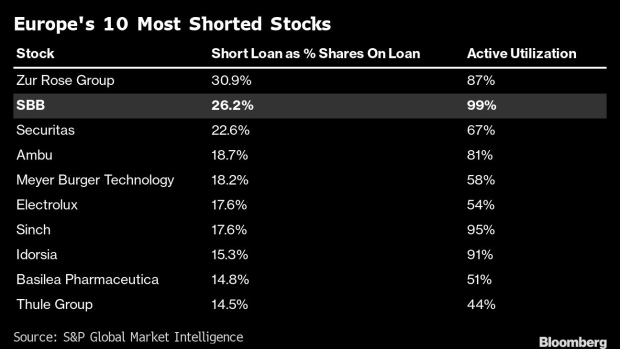Sep 9, 2022
Sweden’s Big Short Foreshadows Trouble for European Real Estate
, Bloomberg News

(Bloomberg) -- A Swedish landlord’s stock has fallen by three quarters this year and investors are betting the worst isn’t over.
SBB, as Samhallsbyggnadsbolaget i Norden AB is more commonly known, has become the second-most shorted stock in Europe, with bearish bets running at 35% of its free float, according to data compiled by S&P Global Market Intelligence. The scenario is based on concerns that SBB piled on too much debt in the boom years to create a portfolio of about 2,500 properties across the Nordic region.
The Stockholm-based company is positioned as the canary in the coal mine for Europe’s teetering real estate market. With Swedish housing prices projected to fall as much as 20% in one of the world’s bubbliest property markets, its business model faces renewed pressure.
A representative for SBB declined to comment on the short interest in the company.
As valuations decline and the cost of capital rises, SBB risks being pushed into fire sales to defend its credit ratings.
“It’s already a bit tough for SBB with its already high loan-to-value ratio,” Emil Ekholm, an analyst at Pareto Securities, said in a streamed interview last week. Under such a scenario, “you could breach certain covenants and that would not be good for the property portfolio.”
SBB is a specialist landlord in community service and rent-regulated residential properties in Sweden and other Nordic countries. It enjoyed a meteoric rise since it was founded by current Chief Executive Officer Ilija Batljan in 2016, but aggressive expansion led to an accumulation of debt -- the yields of which are now trading at levels significantly wider than other real-estate peers.
Its financial risks have caught the attention of short-seller Fraser Perring’s Viceroy Research LLC, which issued a series of scathing reports about the company. SBB has called on Sweden’s financial watchdog to investigate trading activity around the reports and in July published details of its cash flow as a rejoinder to claims that questioned its accounting.
SBB was relatively unknown in credit markets beyond Sweden before the onset of the Covid-19 pandemic. That changed as the company pushed to the vanguard of European real-estate borrowers, amassing billions of euros of debt on bond markets.
Then came this year’s double whammy of interest rate hikes and a marked downturn in investor sentiment. Like many in the sector, SBB saw its borrowing costs spike. Yields on the company’s riskiest debt have jumped to more than four times the 2.875% coupon they were originally sold with.
SBB has about $500 million of debt maturing next year and $1 billion in bonds and loans coming due in 2024, according to data compiled by Bloomberg.
“If we don’t have a bond market that’s as open to real estate companies, it’s going to be tough to refinance all of this,” said Ekholm. “It won’t really be possible to shift all this into bank loans.”
One catalyst for SBB’s bond trading levels is what rating agencies do next. The company is rated one step above junk by both Standard & Poor’s and Fitch Ratings, and a further downgrade could be devastating.
CEO Batljan is vigorously defending its investment-grade status, pushing through a spate of asset sales to get leverage down in the hopes of an upgrade. On Thursday, it signed a letter of intent to sell 9 billion kronor ($841 million) worth of properties to an unidentified institutional investor.
The sales don’t yet appear to be working. In July, S&P cut its outlook on SBB to negative, saying there’s “a one-in-three chance” it would downgrade the company to sub-investment grade, especially if trading conditions remain at weak levels. Such a move would compound the forced selling that has already seen its bonds swoon earlier this summer.
SBB’s main advantage is its portfolio of social housing, with rental revenue stable and its long-term contracts due for inflation-related increases, while its cheap debt means financing costs are still relatively low, according to Pareto’s Ekholm, who has a buy rating on the company. Six of the 11 analysts who follow SBB recommend purchasing the stock.
But short-sellers see the downturn as too much for the landlord to weather unscathed.
“SBB have sold higher yielding assets to trick the market into believing that leverage will decrease,” Perring said in an emailed statement. “SBB will inevitably be downgraded.”
(Updates with analyst’s recommendation)
©2022 Bloomberg L.P.






